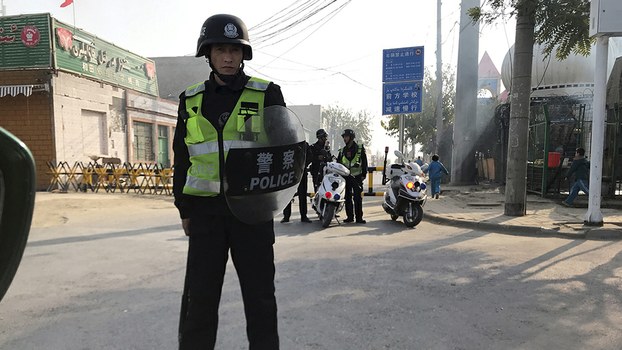Tibetet Segítő Társaság Sambhala Tibet Központ
Tibet Support Association Sambhala Tibet Center
székhely / telephely H-Budapest I. Attila út 123..
(00-36) 70 431 9343 (00-36)70 944 0260 (06-1)782 7721
sambhala@tibet.hu www.tibet.hu tibetpress.info
Facebook/Sambhala Tibet Központ Facebook/Tibett Segítő Társaság
MagnetBank/ 16200010-00110240
IBAN/HU94 16200010 00110240 00000000 SWIFT/HBWEHUHB
(1%) adószám/ 18061347-1-41
nyitva tartás/hétköznap 12.00-20.00 hétvégén előadás függő
» tibeti művészet» lapszemle.hu» thetibetpost.com» eastinfo.hu» rangzen.net» ChoegyalTenzin» tibet.net» phayul.com» DalaiLama.com» vilaghelyzete.blogspot.com» Videók» Linkek» TibetiHírek» Szerkesztőség
Overcrowded Political Re-Education Camps in Hotan Relocate Hundreds of Uyghur Detainees/ENG
2018. január 26./RFA/TibetPress
eredeti cikk
Political re-education camps in Hotan (in Chinese, Hetian) prefecture, in northwest China’s Xinjiang region, face such severe overcrowding that authorities have been forced to relocate hundreds of Uyghur inmates at a time to alternate facilities, according to a local fireman.
Since April last year, ethnic Uyghurs accused of harboring “extremist” and “politically incorrect” views have been detained in re-education camps throughout Xinjiang, where members of the ethnic group have long complained of pervasive discrimination, religious repression, and cultural suppression under Chinese rule.
Prior reporting by RFA’s Uyghur Service found that as arrests in Xinjiang increased around the sensitive 19th Communist Party Congress in Beijing in October, the region’s re-education camps have been inundated by detainees, who are forced to endure cramped and squalid conditions in the facilities.
According to a staff member of Hotan’s Qaraqash (in Chinese, Moyu) county fire brigade, two re-education camps in the Gong Ye Yuan Qu ethnic Han Chinese settlement were so overcrowded in November that hundreds of inmates were sent in a convoy of trucks to a separate camp at the county railway station.
“There were 16 vehicles loaded with people,” said the fireman, who spoke to RFA on condition of anonymity, adding that the transfer was ordered “because of the overflow of people.”
As many as 640 Uyghurs were sent to the railway station camp, he said, in trucks carrying “30 to 40 people” each that were escorted by the county fire brigade’s search and rescue vehicles.
“The people from the two different camps were transferred to the Railway Re-education Camp,” the fireman said.
While he was unable to provide an exact number of detainees held at the Gong Ye Yuan Qu re-education camps, the fireman estimated that each facility holds several thousand inmates—numbers similar to what RFA has uncovered through previous reporting on camps throughout the Xinjiang region.
Earlier this month, sources told RFA that detention centers in Korla (Kuerle), the seat of central Xinjiang’s Bayin’gholin Mongol (Bayinguoleng Menggu) Autonomous Prefecture, are “completely full” and have been turning detainees away because they could not accommodate them.
Naman Bawdun, the former head and Communist Party secretary of Bashawat village, in Korla’s Awat township, said that during the course of a few days last month he had joined around 1,000 people awaiting health checks at the city’s main hospital, ahead of being admitted to re-education camps.
Bawdun, who was released due to a medical condition, quoted a friend who was admitted to the camp as saying he had seen officials from the facility tell the police to “stop bringing people … as it is already too full.”
The friend described cells that had previously held eight people now accommodating 14 inmates, who “were not allowed pillows” and “had to lay on their sides because there was not enough room to lay flat,” let alone space to turn over or stretch their legs.
Number of inmates
Chinese authorities have not publicly acknowledged the existence of re-education camps in Xinjiang, and the number of inmates kept in each facility remains a closely guarded secret, but Uyghur activists estimate that up to 1 million Uyghurs have been detained throughout the region since April 2017.
Central and regional authorities do not provide information about the size of the camp population to local Communist Party cadres, members of local police forces, and other lower-level organizations involved in maintaining the system.
Earlier this week, a security official with knowledge of the detention system told RFA that around 120,000 ethnic Uyghurs are currently being held in re-education camps in Xinjiang’s Kashgar (Kashi) prefecture alone.
Speaking to The Guardian on Thursday, Maya Wang, a campaigner with New York-based Human Rights Watch who wrote a recent report on the re-education camps, said the figures for the number of Uyghurs held in Kashgar were “credible, although growing levels of repression in Xinjiang meant reliable numbers were impossible to ascertain.”
Wang said estimates of the total number of people who have spent time in such centers in Xinjiang, which has a population of about 22 million, ran as high as 800,000.
“It’s just like a black hole which people are added to and don’t get out of,” she told The Guardian.
Since Xinjiang party chief Chen Quanguo was appointed to his post in August 2016, he has initiated unprecedented repressive measures against the Uyghur people and ideological purges against so-called “two-faced” Uyghur officials—a term applied by the government to Uyghurs who do not willingly follow directives and exhibit signs of “disloyalty.”
China regularly conducts “strike hard” campaigns in Xinjiang, including police raids on Uyghur households, restrictions on Islamic practices, and curbs on the culture and language of the Uyghur people, including videos and other material.
While China blames some Uyghurs for "terrorist" attacks, experts outside China say Beijing has exaggerated the threat from the Uyghurs and that repressive domestic policies are responsible for an upsurge in violence there that has left hundreds dead since 2009.
Reported by Shohret Hoshur for RFA’s Uyghur Service. Translated by RFA’s Uyghur Service. Written in English by Joshua Lipes.
